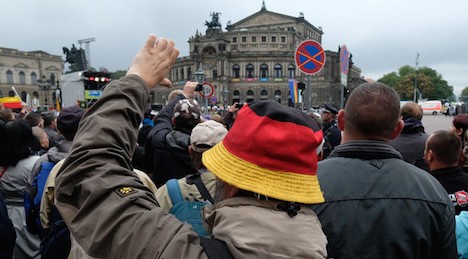Angela Merkel was jeered and whistled as she arrived at German Reunification Day celebrations in Dresden on Monday.
Shouts of “get out” were heard as the German chancellor arrived in Dresden – birthplace of xenophobic movement Pegida – for celebrations.
The angry crowd in the east German city also waved signs saying “Merkel must go”.
The German leader has been under pressure at home over her liberal refugee policy that saw an influx of nearly one million migrants last year.
Dresden is hosting national celebrations to mark 26 years since the reunification of East and West Germany, with the chancellor and President Joachim Gauck in attendance.
Supporters of Pegida, the anti-immigrant, xenophobic group that began in Dresden, also gave Gauck a hostile greeting upon his arrival for the events.
The group initially drew just a few hundred supporters to demonstrations before gaining strength, peaking with rallies of up to 25,000 people in early 2015.
Though Merkel’s conservative Christian Democrats (CDU) took a drubbing in recent regional polls, she insisted on the sidelines of Monday’s celebrations that “mutual respect” and “acceptance of very divergent political opinions” are needed to meet the challenges facing Germany.
The right-wing populist Alternative for Germany (AfD) harnessed a wave of anger over the refugee influx to claim around 14 percent of the vote last month the Berlin state vote.
Its success has mirrored the march of anti-migrant parties in France, Austria and the Netherlands as well as Republican maverick Donald Trump in the United States.
Bomb attacks hit a mosque and an international convention centre in Dresden last week, with police suspecting xenophobic and nationalist motives.
Saxony, of which Dresden is the state capital, saw far-right hate crimes targeting shelters for asylum seekers rise to 106 in 2015, with another 50 recorded in the first half of this year.
In an annual report outlining progress since reunification, the government warned last week that growing xenophobia and right-wing extremism could threaten peace in eastern Germany.
















